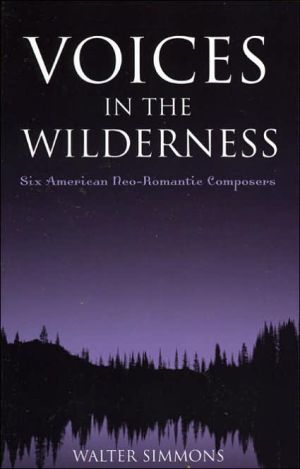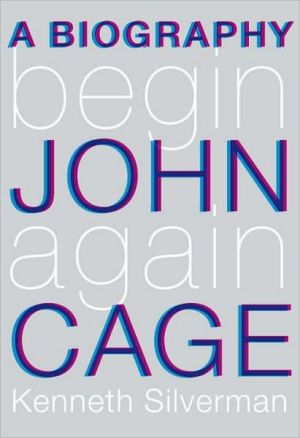Voices in the Wilderness: Six American Neo-Romantic Composers
Despite the Modernist search for new and innovative aesthetics and rejection of traditional tonality, several twentieth century composers have found their own voice while steadfastly relying on the aesthetics and techniques of Romanticism and 19th century composition principles. Musicological and reference texts have regarded these composers as isolated exceptions to modern thoughts of composition—exceptions of little importance, treated simplistically and superficially. Music critic and...
Search in google:
Musicologist and critic Simmons focuses on a group of composers born between 1880 and 1930 whose work is primarily concerned with evoking mood, depicting abstract or referential drama, and expressing personal and subjective emotion. He suggests that they may be the most conservative of the traditionalists, because they embraced many of the stylistic features of late-19th-century music. They are Ernest Bloch, Howard Hanson, Vittorio Giannini, Paul Creston, Samuel Barber, and Nicolas Flagello. Annotation ©2004 Book News, Inc., Portland, OR
Acknowledgments1Introduction12Ernest Bloch213Howard Hanson1114Vittorio Giannini1515Paul Creston1916Samuel Barber2437Nicolas Flagello327Index401
\ ChoiceRecommended. Upper-division undergraduates through faculty; professionals; general readers.\ \ \ \ \ American Record GuideNumerous quotations as well as notes and bibliography reflect the author's painstaking research. Of special interest to record collectors, there's a discography of "essential" recordings for each composer...a special pleasure of Voices in the Wilderness is the remarkable precision and clear-sightedness of Simmons's analyses of his six composers' strengths and weaknesses.In sum, this is a scrupulous, detailed, thoughtful, enlightening, and much-needed book on an important group of modern American composers who've been until now much too easily dismissed as reactionaries and throwbacks. We're fortunate that someone with a lifetime of devotion to their music has written it.\ \ \ Classical NetThe book's virtues shine. Simmons writes clearly and even eloquently…providing both an introduction for the novice and a deeper instruction for someone already acquainted with the music.\ — Steve Schwartz\ \ \ \ \ Fanfare MagazineI can only cheer as Simmons delivers knockout punches to the serialist academics who ruled the world and American music scenes in the 1960s and 1970s...the author delivers some brilliant flashes of insight...This alternate version of a period of history of American music could hardly be better represented than by Voices in the Wilderness.\ \ \ \ \ Musicweb InternationalSimmons' book should be a set text for students of music history everywhere. The marginalisation of some musicians, the primacy of fashion and the brutal interface between economics and arts make for provocative reading . . . Slake your enthusiastic curiosity with this well informed and poised book but be prepared to discover new enthusiasms and the nagging grains of fresh curiosity . . . do not be surprised if you come away with questions seriously disturbing to the concert and recording status quo.\ — Rob Barnett\ \ \ \ \ CrisisAs a work of music criticism, Voices is as close to a model of its kind as anything I have ever read....Simmons's introduction, in which he lays out the case for reconsidering these composers and the reasons for their neglect, is worth the price of the book by itself....I am in admiration of what he has achieved here. I am also immensely grateful for the in-depth treatment afforded to each of these six composers...The very hardest thing for a music critic to do is to put in words the 'meaning' of a piece of music. Simmons is particularly gifted in doing this, and it is what makes Voices so valuable.\ — Robert Reilly\ \ \ \ \ Classical Voice North CarolinaA very thoroughly researched, well-organized, and well-written study…authoritative and, at the same time eminently readable for both the expert and the novice…That the work is a labor of love is evident at every turn, yet the obvious love of this music does not give rise to subjective bias. It is a scholarly, objective analysis of the material. Simmons demonstrates everywhere a deep and thorough knowledge of the works, their structure, and their thematic and melodic content.\ \ \ \ \ Commentary...useful and admirable for reasons other than its specific critical. To begin with, [Simmons'] introduction offers an impressively clear summary of the various ways in which the history of musical modernism is in need of correction and revision. His largely non-technical descriptions of the music discussed in Voices in the Wilderness are models of accessibility. Above all, he is a thoughtful, balanced critic whose respect for his subjects does not stop him from admitting their flaws; his analysis of Samuel Barber's musical style, for example, is exceptionally fair-minded and insightful.\ \ \ \ \ The Gramophone...Simmons does a thorough job in sampling the critical evaluations of his subjects during different eras...[he] is both vivid in his own descriptions of the music and level-headed in his judgments. He is unafraid of challenging opinions he deems ill-considered...or of pointing out when his pet composers are not at their best...The lasting value of this book, however, lays not in its individual profiles, but in the way Simmons threads them together.\ — Michael Quinn\ \ \ \ \ Piano ProfessionalSimmons examines the lives and music of Bloch, Barber, Howard Hanson, Paul Creston, Vittorio Giannini and Nicolas Flagello, a loyalty to tonality being the connecting factor. American musical history, Simmons argues, has tended to concentrate on composers who, in some way, rejected traditional harmonic language, and has marginalised those who stayed faithful to it.\ \ \ \ \ The University BookmanIn this persuasively argued and passionately committed book, musicologist Walter Simmons makes his discussion of six American composers the occasion for rebutting a full half-century of the musically correct denigration of a compositional style—or school or tradition—whose main purpose was and is direct emotional communication with the audience....Simmons has done an inestimably important service in making a cogent case for the Neo-Romantic Aesthetic. It is to be hoped that, through his book, the burgeoning case for his six exemplary composers will be sustained.\ — Thomas F. Bertonneau, Visiting Professor at SUNY 'swego\ \ \ \ \ Reference and Research Book NewsMusicologist and critic Simmons focuses on a group of composers born between 1880 and 1930 whose work is primarily concerned with evoking mood, depicting abstract or referential drama, and expressing personal and subjective emotion. He suggests that they may be the most conservative of the traditionalists, because they embraced many of the stylistic features of late-19th-century music. They are Ernest Bloch, Howard Hanson, Vittorio Giannini, Paul Creston, Samuel Barber, and Nicolas Flagello.\ \ \ \ \ Classical NetThe book's virtues shine. Simmons writes clearly and even eloquently…providing both an introduction for the novice and a deeper instruction for someone already acquainted with the music.\ \ \ \ \ Musicweb InternationalSimmons' book should be a set text for students of music history everywhere. The marginalisation of some musicians, the primacy of fashion and the brutal interface between economics and arts make for provocative reading . . . Slake your enthusiastic curiosity with this well informed and poised book but be prepared to discover new enthusiasms and the nagging grains of fresh curiosity . . . do not be surprised if you come away with questions seriously disturbing to the concert and recording status quo.\ \ \ \ \ CrisisAs a work of music criticism, Voices is as close to a model of its kind as anything I have ever read....Simmons's introduction, in which he lays out the case for reconsidering these composers and the reasons for their neglect, is worth the price of the book by itself....I am in admiration of what he has achieved here. I am also immensely grateful for the in-depth treatment afforded to each of these six composers...The very hardest thing for a music critic to do is to put in words the 'meaning' of a piece of music. Simmons is particularly gifted in doing this, and it is what makes Voices so valuable.\ \ \ \ \ Gramophone...Simmons does a thorough job in sampling the critical evaluations of his subjects during different eras...[he] is both vivid in his own descriptions of the music and level-headed in his judgments. He is unafraid of challenging opinions he deems ill-considered...or of pointing out when his pet composers are not at their best...The lasting value of this book, however, lays not in its individual profiles, but in the way Simmons threads them together.\ \ \ \ \ The University BookmanIn this persuasively argued and passionately committed book, musicologist Walter Simmons makes his discussion of six American composers the occasion for rebutting a full half-century of the musically correct denigration of a compositional style—or school or tradition—whose main purpose was and is direct emotional communication with the audience....Simmons has done an inestimably important service in making a cogent case for the Neo-Romantic Aesthetic. It is to be hoped that, through his book, the burgeoning case for his six exemplary composers will be sustained.\ \ \ \ \ Music Reference Services QuarterlyAs a historical source, it is of value...It is commendable...\ \








